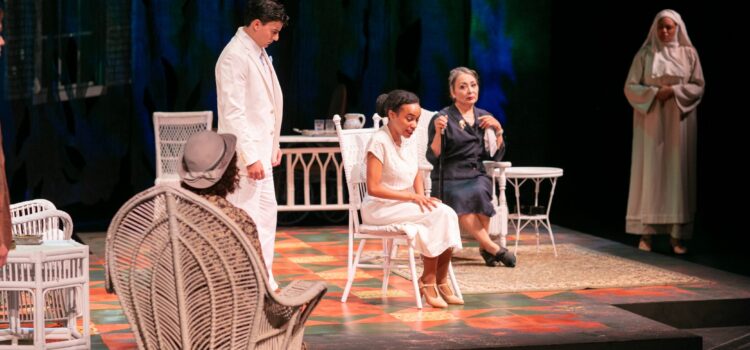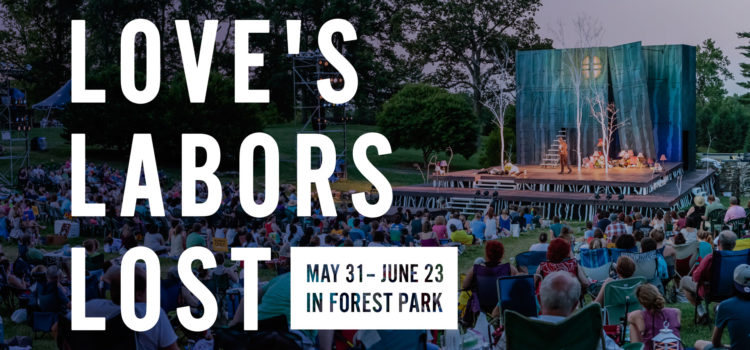By Lynn Venhaus
Featuring an indelible performance by Naima Randolph as the traumatized Catharine Holly in an impeccably staged “Suddenly Last Summer,” this year’s Tennessee Williams Festival St. Louis’ centerpiece created a vivid atmospheric contemplation on mental health, homophobia, and the truth.
These topics often associated with the playwright are still thought-provoking in contemporary times, some 66 years after he wrote it in New York City and first presented off-Broadway in 1958 as a 90-minute one-act, double-billed with “Something Unspoken.”
One of Williams’ most haunting and lyrical works, “Suddenly Last Summer” is best known for the melodramatic 1959 movie starring three future legends –Elizabeth Taylor as Cathy and Katherine Hepburn as Violent Venable, both Oscar-nominated for their performances, and Montgomery Clift as Dr. “Sugar,” and those shadows loom large.
The screenplay, a Williams’ collaboration with Gore Vidal, differs from the play in opening it up to show scenes at the beach, and other scenes, characters, and subplots were added. This being through a ‘50s lens, they had to remove explicit references to homosexuality. It’s a different world today in terms of taboos, although people still use each other, and issues raised persist.
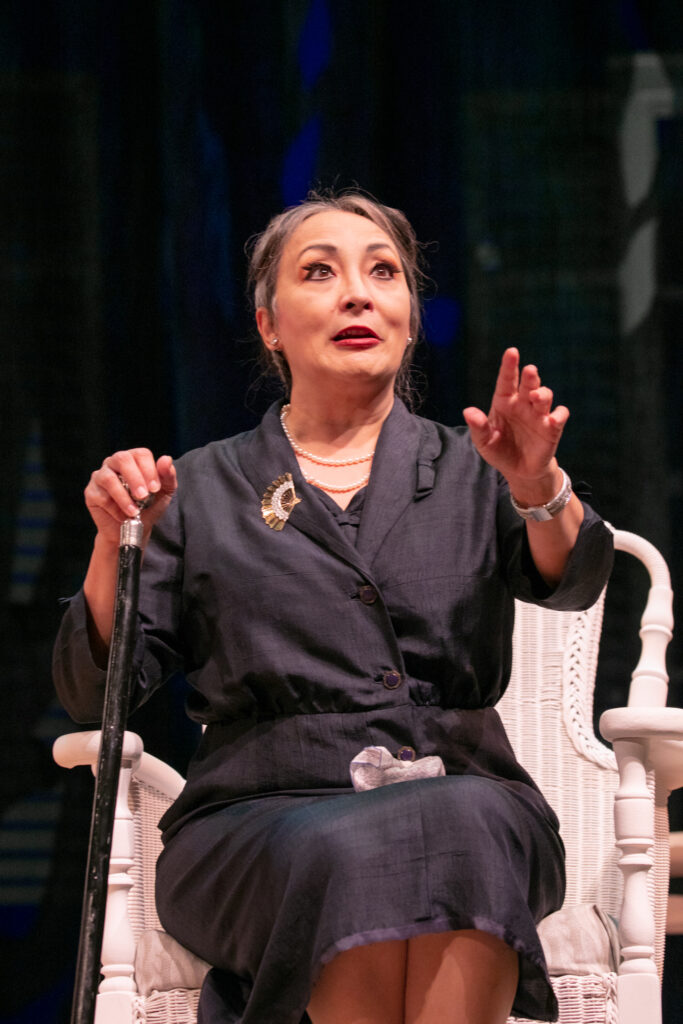
However dated the material, director Tim Ocel doesn’t downplay the inferences. He is a master at interpreting Williams’ artistry, making it relatable for a modern audience.
Along with producer Carrie Houk, a master caster and the festival’s executive producer, he has put together a powerhouse ensemble, who brings to life many dark elements of human nature – including greed, deception, delusion, desire, desperation, and dominance.
Just as he did in a stunning “A Streetcar Named Desire” in 2018 and meticulous “The Night of the Iguana” in 2019, both at The Grandel, Ocel’s retelling is fresh and visionary, emphasizing the horror of a tragic death that is framed like a fascinating murder mystery and gripping courtroom drama.
Oh, what a tangled web we find the Venable family in when they reinforce lies over truth. At the domineering matriarch’s mansion in the affluent Garden District of New Orleans in 1936, brain surgeon Dr. Cukrowicz, aka “Dr. Sugar,” is summoned there to review her niece’s case.
Through her wealth, the bitter Violet hopes to keep Cathy institutionalized and have a lobotomy performed, so that a scandalous family secret won’t be exposed. She has kept her in a private mental asylum since she returned from Europe.
Violet’s cherished son, Sebastian, a closeted gay poet, has been brutally killed while on vacation in Spain, accompanied by his cousin instead of Mommie dearest. The circumstances are unclear, and no one believes Cathy’s horrific account. Locked away against her will, she has been further victimized by her treatment. Now, she can not only reveal the ugly truth but be spared more damage.
Randolph is spellbinding as she recounts the details of a summer holiday at Cabeza de Lobo to those assembled, led by an always stellar Bradley Tejeda as Dr. Sugar, who skillfully guides the proceedings as he gently probes a vulnerable and broken Cathy.
Cathy knows she is being manipulated, and after being injected with a truth serum, weaves a riveting account of being a decoy to attract young boys for the predatory Sebastian’s exploitation. She was used just like they were, but instead of earning sympathy, she’s trying to be suppressed by everyone.
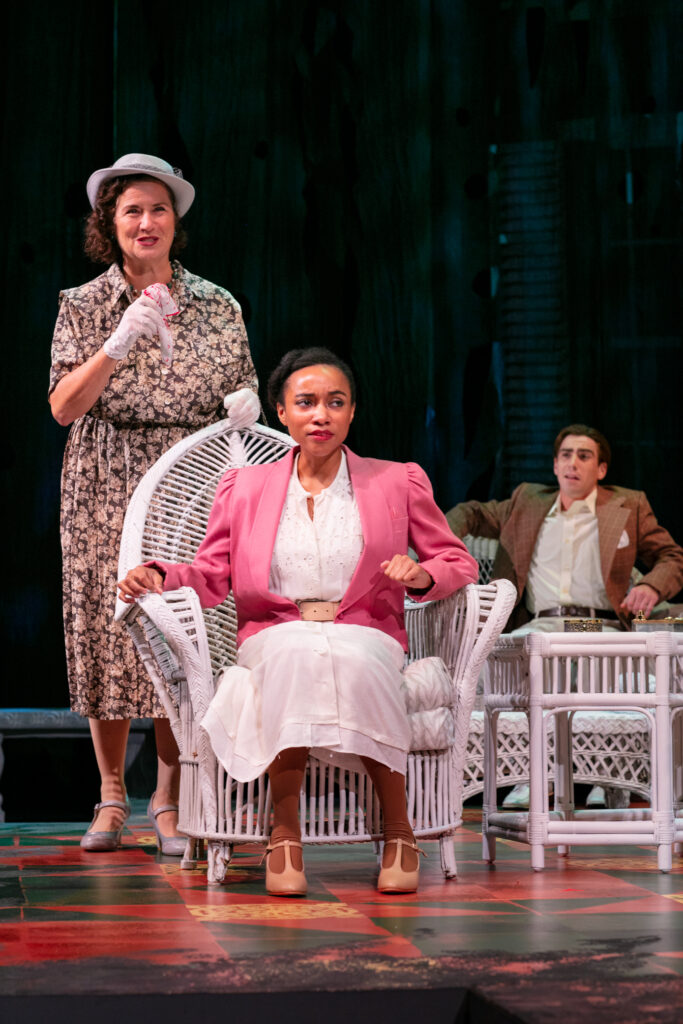
Dr. Sugar’s not entirely convinced Cathy is insane, but at stake is a large donation to his psychiatric research from Mrs. Venable.
Tejeda, brilliant as Tom in 2021’s outdoor “The Glass Menagerie” and comical as Alvaro in last year’s “The Rose Tattoo,” is cool and calm in a crisp white suit, fully aware of the evil in the Venable’s jungle-garden, where his interrogation takes place.
Lisa Tejero deftly commands the stage as the controlling Mama Bear who makes her late husband’s family feel small in her presence, ready to pounce on those she considers duplicitous and weak. She will do whatever it takes to preserve her son’s legacy, even if it is fiction.
Clad in black and using a cane as a scepter, Tejero displays cunning in all interactions, as well as impatience and aggravation when things don’t go her way. She also conveys selfishness, an appalling lack of civility as a socialite and less-than-gracious hostess.
Cathy’s mother and brother, Mrs. Holly and George, eager to not have anything interfere with the $100,000 inheritance bequeathed by Sebastian in his will, are trying not to act anxious, but their true colors emerge. Rengin Altay as the fretful in-law, and Harrison Farmer, as her ambitious son, comfortably service Williams’ script in these stock characters.
In other supporting roles are Bethany Barr as Violet’s accommodating assistant Miss Foxhill, and Ieshah Edwards as the not-so-compassionate Sister Felicity.
Of course, Williams would name characters Venable and Felicity, as he mines his life for a sad exploration of horrible human behavior.
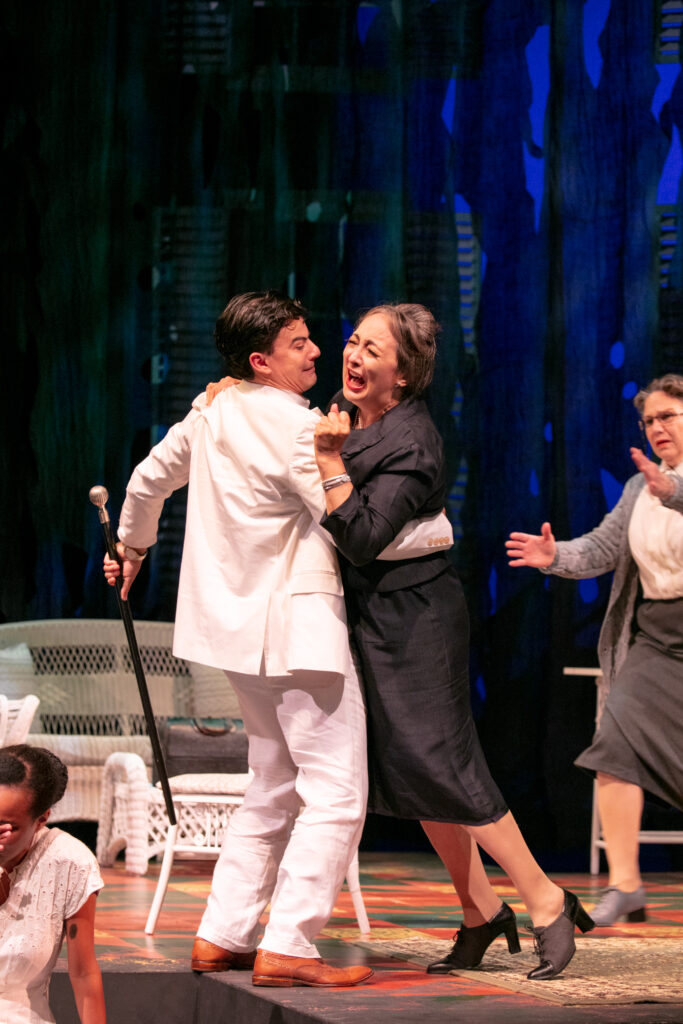
The production team has enhanced the Southern gothic moods, with captivating lighting design by Matthew McCarthy, evocative set design by James Wolk, and polished period costume design by Dottie Marshall Englis. Henry Palkes’ original music score, this third for TWSTL, adds so much texture to these productions.
What is missing in Williams’ play is the protagonist, and it is up to the cast to flesh out Sebastian, and all his contradictions, through the filters of his mother and cousin. The actors conjure up graphic images through their ability to craft a portrait through language.
Many of Williams’ tortured soul characters face moral dilemmas, either as prey or predator, to survive in an unforgiving world. Randolph’s unnerving portrait of a victim shatters the norms, which is what Williams so often does.
While her performance leaves a lasting impression, that’s not the only memorable aspect. The nuance and craft have left their mark on this eighth annual festival, which continually surprises with new ways and different angles to Williams’ storytelling.
The Tennessee Williams Festival St. Louis presents “Suddenly Last Summer” Sept. 7 – 17, with Thursday through Saturday performances at 7:30 p.m. and Sunday matinees at 3 p.m. in the Catherine B. Berges Theatre at COCA, University City. For more information, visit www.twstl.org
Photos by Suzy Gorman
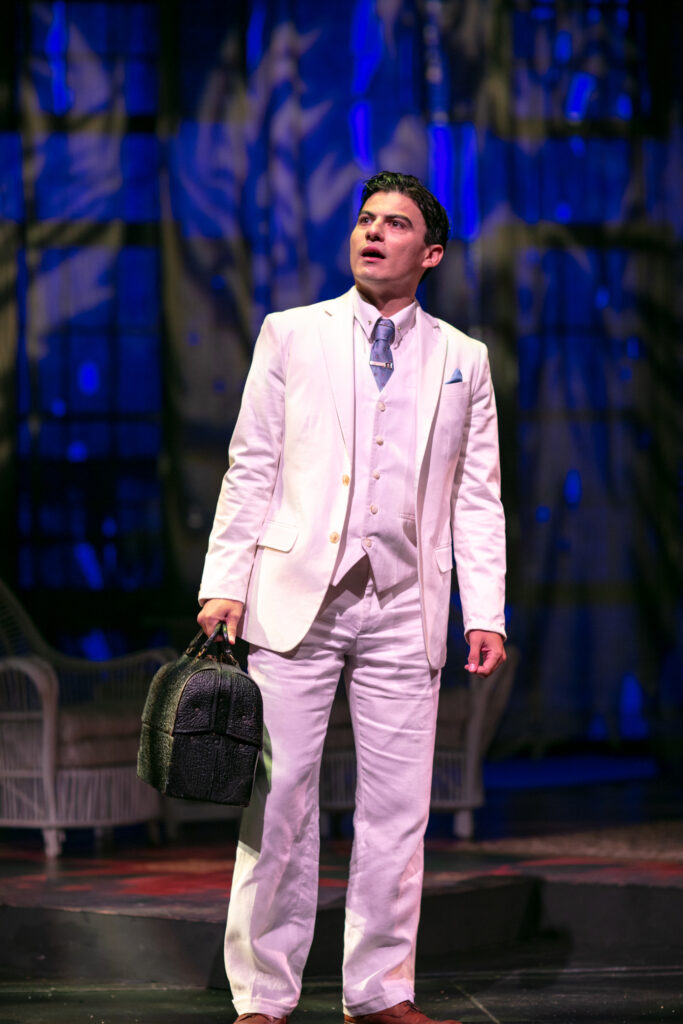

Lynn (Zipfel) Venhaus has had a continuous byline in St. Louis metro region publications since 1978. She writes features and news for Belleville News-Democrat and contributes to St. Louis magazine and other publications.
She is a Rotten Tomatoes-approved film critic, currently reviews films for Webster-Kirkwood Times and KTRS Radio, covers entertainment for PopLifeSTL.com and co-hosts podcast PopLifeSTL.com…Presents.
She is a member of Critics Choice Association, where she serves on the women’s and marketing committees; Alliance of Women Film Journalists; and on the board of the St. Louis Film Critics Association. She is a founding and board member of the St. Louis Theater Circle.
She is retired from teaching journalism/media as an adjunct college instructor.

